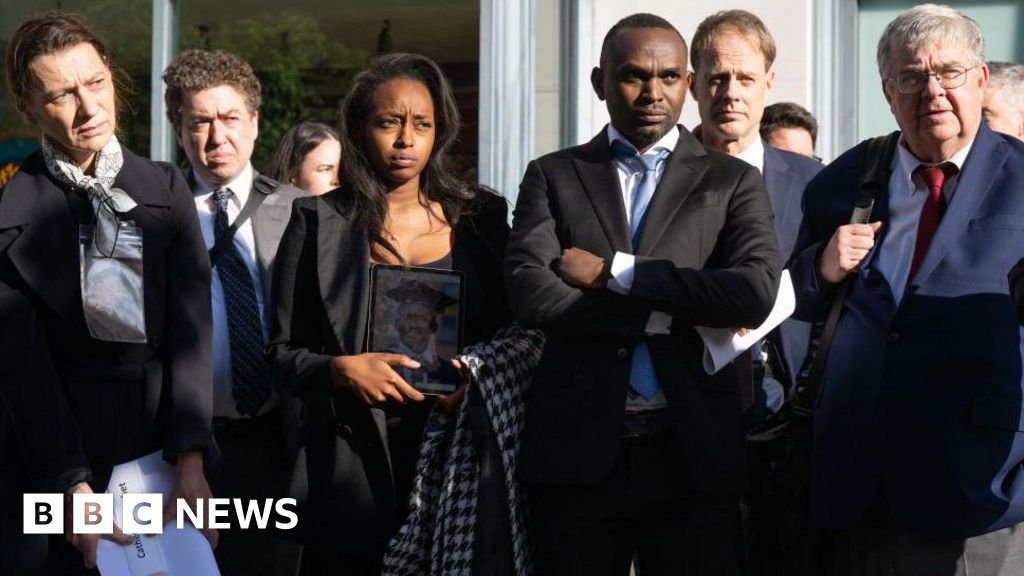Boeing has agreed to plead guilty to one count of criminal fraud after the U.S. found the company violated an agreement aimed at reforming it after two fatal crashes of its 737 Max planes killed 346 passengers and crew. Conspiracy charges.
The US Department of Justice (DoJ) said the aircraft manufacturer also agreed to pay a $243.6 million (£190 million) criminal fine.
However, families of those killed on the flight five years ago have criticized it as a “sweetheart deal” that would allow Boeing to avoid taking full responsibility for the deaths.
By pleading guilty, Boeing will avoid the spectacle of a criminal trial — something the victims’ families have been urging.
The company has been in crisis over its safety record since two nearly identical crashes involving 737 Max aircraft in 2018 and 2019.
In 2021, prosecutors charged Boeing with one count of conspiracy to defraud regulators, alleging that the company deceived the FAA about its MCAS flight control system, which was implicated in two crashes related.
It agreed not to sue Boeing if it paid the fine and successfully completed three years of enhanced monitoring and reporting.
But in January, shortly before that period came to an end, a door panel on a Boeing plane operated by Alaska Airlines exploded shortly after takeoff, forcing the plane to land.
No one was injured in the incident, but it intensifies scrutiny of Boeing’s progress in improving its safety and quality record.
In May, the U.S. Department of Justice said it found Boeing violated terms of the agreement and could be sued.
Boeing’s decision to plead guilty remains a major stain on the company because it means the company – a prominent military contractor for the U.S. government – now has a criminal record.
It is also one of the two largest commercial aircraft manufacturers in the world.
It’s unclear how the criminal record will affect the company’s contracting business. Governments typically ban or suspend companies with records from bidding, but exemptions can be granted.
However, attorney Paul Cassell, who represents the families of those killed on the 2018 and 2019 flights, said: “The memory of Boeing’s murder of 346 innocent people demands more justice than that.”
In a letter to the government in June, he urged the Justice Department to fine Boeing more than $24 billion.
Ed Pearson, executive director of the Aviation Safety Foundation and a former senior manager at Boeing, said the request was “very disappointing” and “a bad deal for justice.”
“Instead of holding individuals accountable, they basically gave them another get-out-of-jail-free card,” he said.
In late October 2018, a Boeing 737 Max aircraft operated by Indonesia’s Lion Air crashed shortly after takeoff, killing all 189 people on board. A few months later, an Ethiopian Airlines plane crashed, killing all 157 passengers and crew.
In the 2021 agreement, Boeing also agreed to pay $2.5 billion to resolve the matter, including $243 million in criminal fines and $500 million to a victims fund.
The deal angered family members who were not consulted on terms and called for the company to go to trial.
Senior Justice Department staff recommended supporting prosecutions, CBS News, the BBC’s U.S. news partner, reported in late June.
At a hearing in June, Sen. Richard Blumenthal said he believed the “almost overwhelming evidence” suggested prosecution should be pursued.
Lawyers for family members said the Justice Department was concerned there was no strong case against the company.
Former Boeing technical pilot Mark Forkner, the only person to face criminal charges in connection with the incident, was acquitted by a jury in 2022.
Mark Cohen, an emeritus professor at Vanderbilt University who studies corporate punishment, said prosecutors often prefer plea deals or deferred prosecution agreements, which allow them to avoid the risk of a trial and give the government more power than a typical corporation. sentence.
“Because it’s easier than going to trial, it might reduce the burden on prosecutors, but prosecutors might also think it’s a better sanction. [because] They may be able to make requests that are not typically found in the sentencing guidelines,” he said.
He said there was no doubt that Boeing’s status as a major government contractor played a role in deciding how to proceed.
“They have to think about the collateral consequences,” he said. “You can’t take cases like this lightly.”
The MCAS issue isn’t Boeing’s first run-in with the law.
The company has also paid millions of dollars in fines to the Federal Aviation Administration since 2015 to resolve a series of claims about improper manufacturing and other problems.
The company also continues to face investigations and lawsuits stemming from an incident on an Alaska Airlines flight in January.

